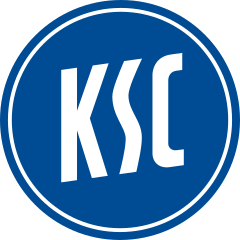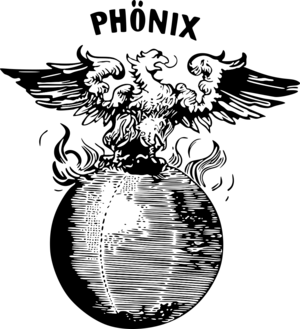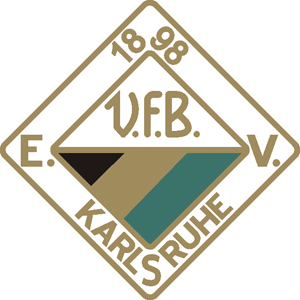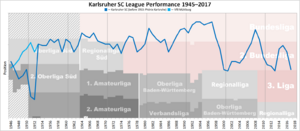Karlsruher SC facts for kids
 |
||||
| Full name | Karlsruher Sport-Club Mühlburg-Phönix e. V. |
|||
|---|---|---|---|---|
| Nickname(s) | KSC, Eurofighter (since 93–94 season) | |||
| Founded | 6 June 1894 | |||
| Ground | BBBank Wildpark | |||
| Capacity | 34,302 | |||
| President | Holger Siegmund-Schultze | |||
| Head coach | Christian Eichner | |||
| League | 2. Bundesliga | |||
| 2020–21 | 2. Bundesliga, 6th of 18 | |||
|
||||
Karlsruher SC, also known as KSC, is a German football club. It is located in the city of Karlsruhe, in Baden-Württemberg. The club currently plays in the 2. Bundesliga, which is the second highest football league in Germany.
KSC has a proud history. They won the German championship in 1909. They also won the DFB-Pokal (German Cup) twice, in 1955 and 1956. In Europe, KSC won the UEFA Intertoto Cup in 1996. This was their last big trophy.
The club started as Karlsruher Fussball Club Phönix in 1894. The modern club was formed in 1952 after several teams joined together. KSC was one of the first teams to play in the Bundesliga in 1963. For many years, KSC often moved between the first and second divisions. Their best finish in the Bundesliga was 6th place in 1996. KSC has a strong rivalry with VfB Stuttgart.
Contents
Club History
How KSC Was Formed
One of the most successful early clubs was Karlsruher Fussball Club Phönix. It started on June 6, 1894. This club quickly became strong in its region. They won the national championship in 1909. They beat Viktoria 89 Berlin 4–2 in the final. In 1912, Phönix joined with KFC Alemannia to form KFC Phönix (Phönix Alemannia).
This club, Phönix Karlsruhe, played in the Gauliga Baden. This was one of the top leagues in Germany at the time. They played as a combined team called KSG Phönix/Germania Karlsruhe in 1943–44. After World War II, Phönix played in the Oberliga Süd.
Other clubs also helped form KSC. FC Mühlburg started in 1905. FC Germania and FC Weststadt joined to form VfB Karlsruhe in 1911. Then, FC Mühlburg and VfB Karlsruhe merged to create VfB Mühlburg in 1933. This new team started playing in the top league, the Gauliga Baden.
VfB Mühlburg became a stronger team in the 1940s. After the war, they joined the Oberliga Süd in 1947. They often finished in the middle of the table. In 1951, they almost reached the national championship.
The Birth of Karlsruher SC
KFC Phoenix and VfB Mühlburg officially joined together on October 16, 1952. This created the Karlsruher Sport-Club Mühlburg-Phönix e. V. The new team did very well in the 1950s.
In 1955, they won the DFB-Pokal by beating Schalke 04 3–2. They won it again the next year, beating Hamburger SV 3–1. In 1956, they also reached the national final but lost to Borussia Dortmund. KSC won the Oberliga Süd championship in 1956, 1958, and 1960. They were also runners-up in the DFB-Pokal in 1960. Because of their success, KSC was chosen as one of the first 16 clubs for Germany's new professional league, the Bundesliga, in 1963.
KSC found it tough in the Bundesliga. They were relegated to the second division, the Regionalliga Süd, after five seasons. They tried to get promoted back but couldn't for a few years. In 1974, the 2. Bundesliga was formed. KSC won the 2. Bundesliga Süd in 1975 and returned to the top league. They stayed for two years. They were promoted again in 1980 and stayed for four seasons. In 1987, they were promoted back to the Bundesliga for a longer stay.
The Schäfer Years: "Eurofighter" Era
Under coach Winfried Schäfer, KSC became a strong team in the Bundesliga. In the 1993–94 season, they had an amazing run in the UEFA Cup. They reached the semi-finals, losing to Austria Salzburg. Along the way, they beat strong teams like PSV, Valencia, Bordeaux, and Boavista. Their 7–0 win against Valencia was a huge moment for the club. Fans started calling them the "Eurofighter" because of their success in Europe. Edgar "Euro Eddy" Schmitt became a club legend by scoring four goals in that Valencia game.
Between 1992 and 1997, KSC consistently finished in the top half of the Bundesliga. They played in two more UEFA Cups. In 1995, KSC won the DFB-Hallenpokal, an indoor football tournament. They also reached the DFB-Pokal final in 1996 but lost to 1. FC Kaiserslautern.
Towards the end of the 1990s, KSC's performance dropped. They started the 1997–98 Bundesliga season well. But a big 1–6 loss to Bayer Leverkusen started their decline. Coach Schäfer was fired in March 1998. However, KSC was still relegated to the 2. Bundesliga after finishing 16th. They needed a draw against Hansa Rostock on the last day but lost 2–4.
After 1998: Ups and Downs
After being relegated, KSC finished fifth in the 2. Bundesliga in their first season. But in the 1999–2000 season, they finished last. This sent them down to the Regionalliga Süd (third division). The club quickly bounced back. They won the Regionalliga and returned to the second division. After a few average seasons, they improved and finished sixth in 2005–06.
In 2007, KSC won the 2. Bundesliga title with three games left. They were the first team in the history of the single-division 2. Bundesliga to stay in the top spot all season.
When they returned to the Bundesliga in 2007–08, they finished 11th. In the 2008–09 season, they finished 17th and were relegated again to the 2. Bundesliga. After a few more seasons, KSC was relegated to the third tier in 2012.
However, KSC quickly recovered. In 2012–13, they won the 3. Liga championship. This earned them promotion back to the 2. Bundesliga. In 2014–15, KSC almost returned to the Bundesliga. They finished third and played a promotion play-off against Hamburg. After a 1–1 draw in the first game, KSC was very close to promotion. But Hamburg scored a late goal to force extra time and then scored again to stay in the Bundesliga.
In 2019, Karlsruhe won against Preußen Münster. This victory brought them back to the 2. Bundesliga after two years.
Reserve Team: Karlsruher SC II
The Karlsruher SC II is the club's reserve team. It has also had its own successes. For many years, it played in the Regionalliga Süd. In 2012, the team was moved down to the Oberliga. This happened because reserve teams of 3. Liga clubs are not allowed in the Regionalliga. The team had a similar situation in 2000.
Between 1991 and 2000, the reserve team won the North Baden Cup four times. This allowed them to play in the first round of the DFB-Pokal. Their best result was reaching the third round in 1996–97.
The second team was stopped for financial reasons at the end of the 2017–18 season. However, KSC started its second team again in 2019–20. It now plays in the Kreisklasse C, the lowest league level in Karlsruhe.
League Journey Over Time

Club Achievements
Here are some of the awards and titles the club has won:
League Titles
|
Cup Wins
International Trophies
Reserve Team Achievements
|
- All titles before 1952 were won by Phönix Karlsruhe.
Current Players
|
|
Reserve Team Squad
Coaching Staff
Recent Seasons Performance
Here's how Karlsruher SC has performed in recent seasons:
Karlsruher SC Main Team
|
Karlsruher SC II Team
|
|||||||||||||||||||||||||||||||||||||||||||||||||||||||||||||||||||||||||||||||||||||||||||||||||||||||||||||||||||||||||||||||||||||||||||||||||||||||||||||||||||||||||||||||||||||||||||||||||||||||||||||||||||||||||||||||||||||||||||||||||||||||||||||||||||||||||||||||||||||||||||||
- When new leagues like the Regionalliga (1994) and 3. Liga (2008) were created, the leagues below them moved down one tier. In 2012, the Regionalligas were reorganized.
- Key
| ↑ Promoted | ↓ Relegated |
See also
 In Spanish: Karlsruher SC para niños
In Spanish: Karlsruher SC para niños
 | Audre Lorde |
 | John Berry Meachum |
 | Ferdinand Lee Barnett |




